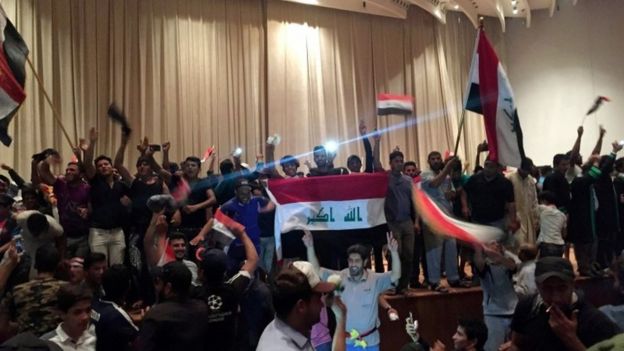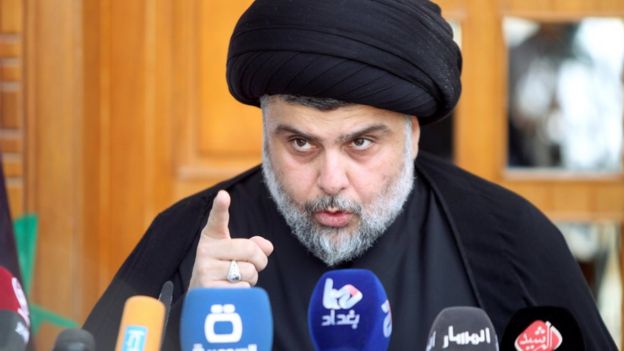- 26 minutes ago
- Middle East
Hundreds of Shia Muslim activists have stormed Iraq's parliament in protest against ongoing deadlock in approving a new cabinet.
Supporters of Shia cleric Moqtada Sadr broke through barricades of the protected Green Zone in Baghdad after MPs again failed to convene for a vote.
A state of emergency has been declared in the Iraqi capital.
Mr Sadr wants PM Haider al-Abadi to commit to a plan to replace ministers with non-partisan technocrats.
Powerful parties in parliament have refused to approve the change for several weeks.
Earlier this week, hundreds of thousands of people marched towards the Green Zone, the most secure part of Baghdad that houses embassies and government buildings, to protest against the political deadlock.
 Reuters
Reuters
A new protest outside the zone escalated after parliament again failed to reach a quorum on Saturday, AFP news agency reports.
Groups marched on the district soon after the end of a televised appearance by Mr Sadr, although he did not call for the storming of parliament.
The protesters stopped lawmakers attempting to flee the building chanting, "The cowards ran away!" AFP reported.
The protesters are reported to have begun ransacking parliament buildings. United Nations and embassy staff were on lockdown inside their compounds, Reuters reported.
Iraq's system of sharing government jobs has long been criticised for promoting unqualified candidates and encouraging corruption.
Mr Abadi, who came to power in 2014, has promised to stamp out corruption and ease sectarian tensions, but he has failed to far to introduce a new technocratic cabinet.
A survey by the Pew Research Centre in 2011 found that 51% of Iraqi Muslims identified themselves as Shia, compared with 42% Sunni.
Elsewhere in Baghdad, a car bomb targeted a group of Shia Muslim pilgrims on Saturday, killing at least 21 people.
Who is Moqtada Sadr?
 Reuters
Reuters
The Shia cleric and his militia group, the Mehdi Army, gained prominence after the US-led invasion of Iraq in 2003. galvanising anti-US sentiment.
Mr Sadr's followers clashed repeatedly with US forces, whose withdrawal the cleric consistently demanded.
An arrest warrant was issued for Mr Sadr in 2004 in connection with the murder of a rival cleric.
His militia was also blamed for the torture and killing of thousands of Sunnis in the sectarian carnage of 2006 and 2007. Mr Sadr fled to Iran during that period.
In 2011, Mr Sadr returned from his self-imposed exile to Iraq, taking a more conciliatory tone and calling for Iraqi unity and peace.

No comments:
Post a Comment